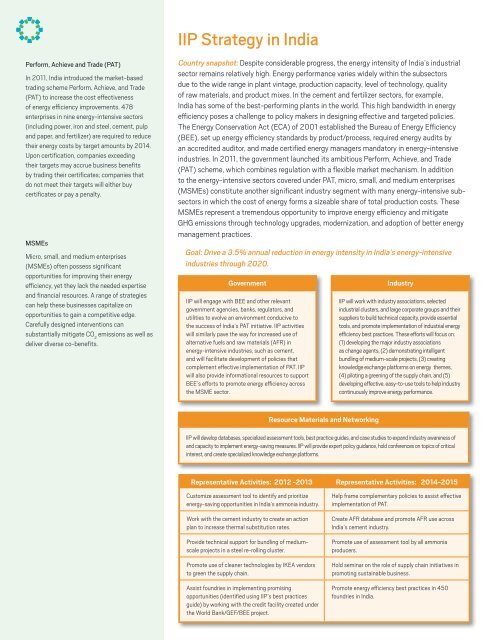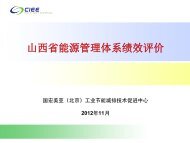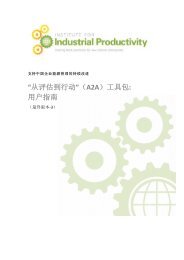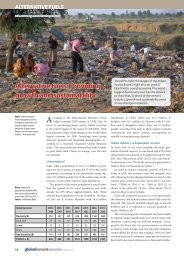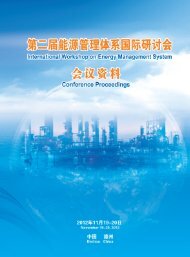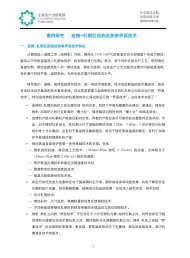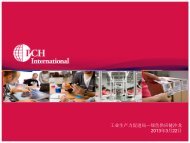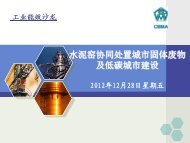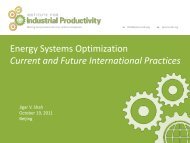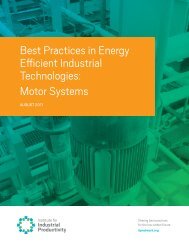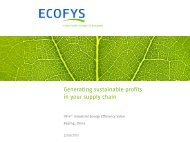Strategic Plan - Institute for Industrial Productivity
Strategic Plan - Institute for Industrial Productivity
Strategic Plan - Institute for Industrial Productivity
Create successful ePaper yourself
Turn your PDF publications into a flip-book with our unique Google optimized e-Paper software.
IIP Strategy in India<br />
Per<strong>for</strong>m, Achieve and Trade (PAT)<br />
In 2011, India introduced the market-based<br />
trading scheme Per<strong>for</strong>m, Achieve, and Trade<br />
(PAT) to increase the cost effectiveness<br />
of energy efficiency improvements. 478<br />
enterprises in nine energy-intensive sectors<br />
(including power, iron and steel, cement, pulp<br />
and paper, and fertilizer) are required to reduce<br />
their energy costs by target amounts by 2014.<br />
Upon certification, companies exceeding<br />
their targets may accrue business benefits<br />
by trading their certificates; companies that<br />
do not meet their targets will either buy<br />
certificates or pay a penalty.<br />
MSMEs<br />
Micro, small, and medium enterprises<br />
(MSMEs) often possess significant<br />
opportunities <strong>for</strong> improving their energy<br />
efficiency, yet they lack the needed expertise<br />
and financial resources. A range of strategies<br />
can help these businesses capitalize on<br />
opportunities to gain a competitive edge.<br />
Carefully designed interventions can<br />
substantially mitigate CO 2<br />
emissions as well as<br />
deliver diverse co-benefits.<br />
Country snapshot: Despite considerable progress, the energy intensity of India’s industrial<br />
sector remains relatively high. Energy per<strong>for</strong>mance varies widely within the subsectors<br />
due to the wide range in plant vintage, production capacity, level of technology, quality<br />
of raw materials, and product mixes. In the cement and fertilizer sectors, <strong>for</strong> example,<br />
India has some of the best-per<strong>for</strong>ming plants in the world. This high bandwidth in energy<br />
efficiency poses a challenge to policy makers in designing effective and targeted policies.<br />
The Energy Conservation Act (ECA) of 2001 established the Bureau of Energy Efficiency<br />
(BEE), set up energy efficiency standards by product/process, required energy audits by<br />
an accredited auditor, and made certified energy managers mandatory in energy-intensive<br />
industries. In 2011, the government launched its ambitious Per<strong>for</strong>m, Achieve, and Trade<br />
(PAT) scheme, which combines regulation with a flexible market mechanism. In addition<br />
to the energy-intensive sectors covered under PAT, micro, small, and medium enterprises<br />
(MSMEs) constitute another significant industry segment with many energy-intensive subsectors<br />
in which the cost of energy <strong>for</strong>ms a sizeable share of total production costs. These<br />
MSMEs represent a tremendous opportunity to improve energy efficiency and mitigate<br />
GHG emissions through technology upgrades, modernization, and adoption of better energy<br />
management practices.<br />
Goal: Drive a 3.5% annual reduction in energy intensity in India’s energy-intensive<br />
industries through 2020.<br />
Government<br />
IIP will engage with BEE and other relevant<br />
government agencies, banks, regulators, and<br />
utilities to evolve an environment conducive to<br />
the success of India’s PAT initiative. IIP activities<br />
will similarly pave the way <strong>for</strong> increased use of<br />
alternative fuels and raw materials (AFR) in<br />
energy-intensive industries, such as cement,<br />
and will facilitate development of policies that<br />
complement effective implementation of PAT. IIP<br />
will also provide in<strong>for</strong>mational resources to support<br />
BEE’s ef<strong>for</strong>ts to promote energy efficiency across<br />
the MSME sector.<br />
Industry<br />
IIP will work with industry associations, selected<br />
industrial clusters, and large corporate groups and their<br />
suppliers to build technical capacity, provide essential<br />
tools, and promote implementation of industrial energy<br />
efficiency best practices. These ef<strong>for</strong>ts will focus on:<br />
(1) developing the major industry associations<br />
as change agents, (2) demonstrating intelligent<br />
bundling of medium-scale projects, (3) creating<br />
knowledge exchange plat<strong>for</strong>ms on energy themes,<br />
(4) piloting a greening of the supply chain, and (5)<br />
developing effective, easy-to-use tools to help industry<br />
continuously improve energy per<strong>for</strong>mance.<br />
Resource Materials and Networking<br />
IIP will develop databases, specialized assessment tools, best practice guides, and case studies to expand industry awareness of<br />
and capacity to implement energy-saving measures. IIP will provide expert policy guidance, hold conferences on topics of critical<br />
interest, and create specialized knowledge exchange plat<strong>for</strong>ms.<br />
Representative Activities: 2012 -2013 Representative Activities: 2014-2015<br />
Customize assessment tool to identify and prioritize<br />
energy-saving opportunities in India’s ammonia industry.<br />
Work with the cement industry to create an action<br />
plan to increase thermal substitution rates.<br />
Provide technical support <strong>for</strong> bundling of mediumscale<br />
projects in a steel re-rolling cluster.<br />
Promote use of cleaner technologies by IKEA vendors<br />
to green the supply chain.<br />
Assist foundries in implementing promising<br />
opportunities (identified using IIP’s best practices<br />
guide) by working with the credit facility created under<br />
the World Bank/GEF/BEE project.<br />
Help frame complementary policies to assist effective<br />
implementation of PAT.<br />
Create AFR database and promote AFR use across<br />
India’s cement industry.<br />
Promote use of assessment tool by all ammonia<br />
producers.<br />
Hold seminar on the role of supply chain initiatives in<br />
promoting sustainable business.<br />
Promote energy efficiency best practices in 450<br />
foundries in India.


